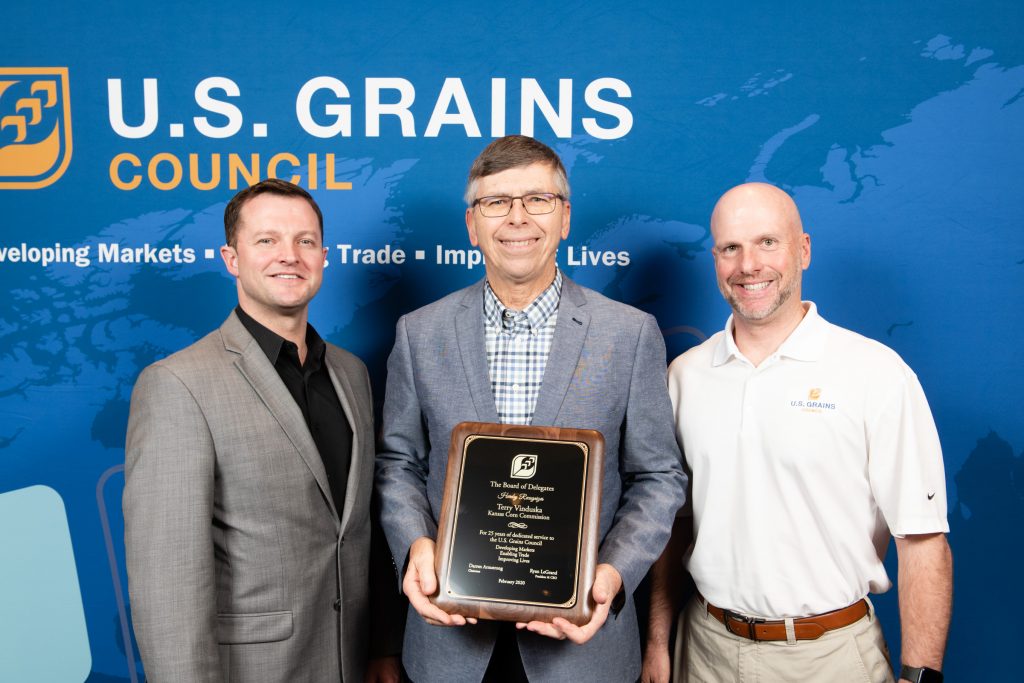An early harvest trip to the elevator in Tampa, Kan., helped Terry Vinduska connect the dots between the value of his corn and the importance of export markets in determining that price – setting in motion 25 years of helping grow both the Kansas corn industry and world markets.
A short while after being selected to represent the Kansas Corn Commission on the U.S. Grains Council (USGC), Vinduska hauled in a load of short-season corn to the elevator. Because it was so early in the season, there was no new corn crop price on the board, so the staff had to call the manager to ask how the price was set. Learning that the price he would receive was based on the price of corn from a neighboring state was all it took for Vinduska to have his “ah-ha” moment about the interconnectedness of the corn market.
“That’s when the light went on in my brain, saying I don’t want other states’ corn coming into Kansas. I want that corn exported so it’s not competing with me,” Vinduska said. “Then the connection was made in my mind about the importance of exports. We need our neighbor states’ corn to be exported, so it’s not competing, and that began the process of doing what I could for the next 25 years to increase exports and increase the value of U.S. corn.”
A Pioneer mission to South America further reinforced the global influence on that local corn price, when Vinduska saw burgeoning corn production in Argentina and Brazil. He later joined the Council’s “Rest Of The World” advisory team – enjoying becoming more involved in the Council’s decision-making process.
When the Council shifted to its current board of directors structure, Vinduska was asked to run, but he didn’t until his daughter and son-in-law returned home to the farm. He won a seat and eventually was elected to the officer rotation, serving as the USGC chairman in 2011.
Throughout that time, Vinduska was increasingly impressed with not only the quality of the board members, but also the quality of each of the Council’s staff members around the world. He specifically remembered being called and asked if it would be a good idea to bring Tom Sleight back to the Council in a leadership role – which he said was one of the very best things that happened when he was chairman, kicking off the growth of the Council to where it is today.
In addition to his service on the Council’s Board of Directors and on the Council’s A-teams, Vinduska has also opened his farm in Marion to trade teams coming to Kansas. One team from Mexico came to his farm to talk about no-till practices, biotechnology and corn production in general. When Vinduska traveled to Mexico a few years later, he saw one of those team members, who remembered visiting his farm. They saw each other again a few years later – all part of developing relationships between farmers and their end-users.
“You develop relationships, and that is one of the beautiful things about the Council,” he said. “It’s not just a buyer-seller; it’s a supplier and a user. It’s about the relationships that you develop over time that helps increase the trust level between the end-user and those of us that are producing the grain.”
Vinduska further expanded his international reach this year by presenting as a U.S. corn farmer during the 2020 corn quality roll-out seminars in Central America.
“It was an honor, a great opportunity and a real pleasure to be able to do that,” he said. “That type of situation is totally different than anything I’ve ever done with the Council because past trips were talking about Council programming, and this gave me the chance to talk about my farm and how we fit into the whole U.S. corn picture.”
He noted that in Guatemala, a large purchase of corn occurred just days after the crop quality seminar promoted buying corn sooner rather than later to lock in supplies. In the Dominican Republic, Vinduska and the USGC delegation had the opportunity to meet with the Minister of Agriculture, who agreed to support the first dried distiller’s grains with solubles (DDGS) feeding trials for the country’s beef sector.
The Council recognized Vinduska for his 25 years working with the organization during its 17th International Marketing Conference and 60th Annual Membership Meeting this week in Tampa, Fla. He noted the significant shifts in both the Council’s work and the growth in Kansas corn production over the years he has been involved in the organizations’ leadership.
“I’m very excited and proud of the fact that Kansas is now a net exporter of corn,” Vinduska said. “Now as we work to develop markets and enable trade for U.S. corn, we are also opening up and increasing markets for Kansas corn. Exports really do matter for every corn producer in the United States.”
Vinduska encouraged all in the Council to dig in and find their own “ah-ha” moments on why trade matters to their farms, their businesses and their daily lives.
“As people show up to their first Council meetings, get involved, go to those A-team meetings, I hope they will see where their passion lies and follow it,” he said. “Involvement without passion will never be productive. You have to be passionate about what you do.”
About The U.S. Grains Council
The U.S. Grains Council develops export markets for U.S. barley, corn, sorghum and related products including distiller’s dried grains with solubles (DDGS) and ethanol. With full-time presence in 28 locations, the Council operates programs in more than 50 countries and the European Union. The Council believes exports are vital to global economic development and to U.S. agriculture’s profitability. Detailed information about the Council and its programs is online at www.grains.org.

